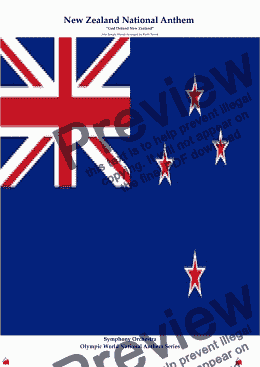Ready to print
You have already purchased this music, but not yet printed it.
This page is just a preview and does not allow printing. To print your purchase, go to the My purchases page in your account and click the relevant print icon.
New Zealand National Anthem for Symphony Orchestra

Already purchased!
You have already purchased this score. To download and print the PDF file of this score, click the 'Print' button above the score. The purchases page in your account also shows your items available to print.
This score is free!
Buy this score and parts
New Zealand National Anthem for Symphony Orchestra
$38.00
$19.00
Preview individual parts:
Instant download
You are purchasing high quality sheet music PDF files suitable for printing or viewing on digital devices.Arranged for the Orchestre national d'Île-de-France.
"God Defend New Zealand" (Māori: "Aotearoa",[a] meaning 'New Zealand') is one of two national anthems of New Zealand, the other being "God Save the King". Legally the two have equal status, but "God Defend New Zealand" is more commonly used. Originally written as a poem, it was set to music as part of a competition in 1876. Over the years its popularity increased, and it was eventually named the second national anthem in 1977. It has English and Māori lyrics, with slightly different meanings. Since the late 1990s, the usual practice when performed in public is to perform the first verse of the national anthem twice, first in Māori and then in English.
"God Defend New Zealand" was written as a poem in the 1870s by Irish-born, Victorian-raised immigrant Thomas Bracken of Dunedin. A competition to compose music for the poem was held in 1876 by The Saturday Advertiser and judged by three prominent Melbourne musicians, with a prize of ten guineas.[4] The winner of the competition was the Vandemonian-born John Joseph Woods of Lawrence, Otago, who composed the melody in a single sitting the evening after finding out about the competition.[5] The song was first performed at the Queen's Theatre, Princes Street in Dunedin, on Christmas Day, 1876. In February 1878, sheet music was published.
A Māori version of the song was produced in 1878 by Thomas Henry Smith of Auckland, a judge in the Native Land Court, on request of Premier George Edward Grey. A copy of the Māori lyrics, using Aotearoa for its title, was printed in Otago newspapers in October 1878. In Smith's original text the word "whakarangona" was used to translate 'hear', rather than the modern "whakarongona".
In 1897, Premier Richard Seddon presented a copy of words and music to Queen Victoria. The song became increasingly popular during the early 20th century, and in 1940 the New Zealand government bought the copyright and made it New Zealand's 'national hymn' in time for that year's centennial celebrations. It was used at the British Empire Games from 1950 onwards, and first used at the Olympics during the 1972 Summer Olympics in Munich. Following the performance at the Munich games, a campaign began to have the song adopted as the national anthem.
"God Save the Queen" was New Zealand's sole national anthem until the 1970s. In May 1973 a remit to change the New Zealand flag, declare a New Zealand republic and change the national anthem was voted down by the Labour Party at their national conference. In 1976 Garth Henry Latta from Dunedin presented a petition to Parliament asking "God Defend New Zealand" to be made the national anthem. With the consent of Queen Elizabeth II, the government of Robert Muldoon gazetted the song as the country's second national anthem on 21 November 1977, on equal standing with "God Save the Queen".
An alternative official arrangement for massed singing by Maxwell Fernie was announced by the Minister of Internal Affairs, Allan Highet on 31 May 1979.Woods' original score was written in the key of A-flat major (concert pitch) and was better suited for solo and choral singing; Fernie's arrangement changed the key down a semitone to G major.
Until the 1990s, only the first verse of the English version was commonly sung. The first public singing of the anthem in both Maori and English was by singers Vicky Lee and Cyndi Joe at the Kiwis-Britain league test in 1992. A public debate emerged after only the first Māori verse was sung by Hinewehi Mohi at the 1999 Rugby World Cup match between the All Blacks and England, and it then became conventional to sing both the Māori and English first verses one after the other.



